Bath Spa University: Vegan Tourism and UK Tourist Challenges
VerifiedAdded on 2020/11/12
|22
|7182
|80
Report
AI Summary
This report investigates the burgeoning field of vegan tourism, examining its definition, components, and the challenges faced by UK-based vegan travelers. It explores the increasing demand for vegan tourism, driven by ethical, health, and environmental concerns, and analyzes the limitations and dilemmas encountered by vegans when planning and experiencing holidays. The research delves into the factors influencing vegan tourism, including lifestyle, social factors, tradition, and cultural differences. It also discusses the research objectives, questions, and methodology employed, including data collection and analysis. The report highlights the importance of understanding vegan tourism in the context of contemporary issues such as sustainability and carbon footprint, providing valuable insights for the tourism industry and vegan travelers alike. Ethical implications are also considered, providing a comprehensive overview of this evolving sector.

Paraphrase This Document
Need a fresh take? Get an instant paraphrase of this document with our AI Paraphraser
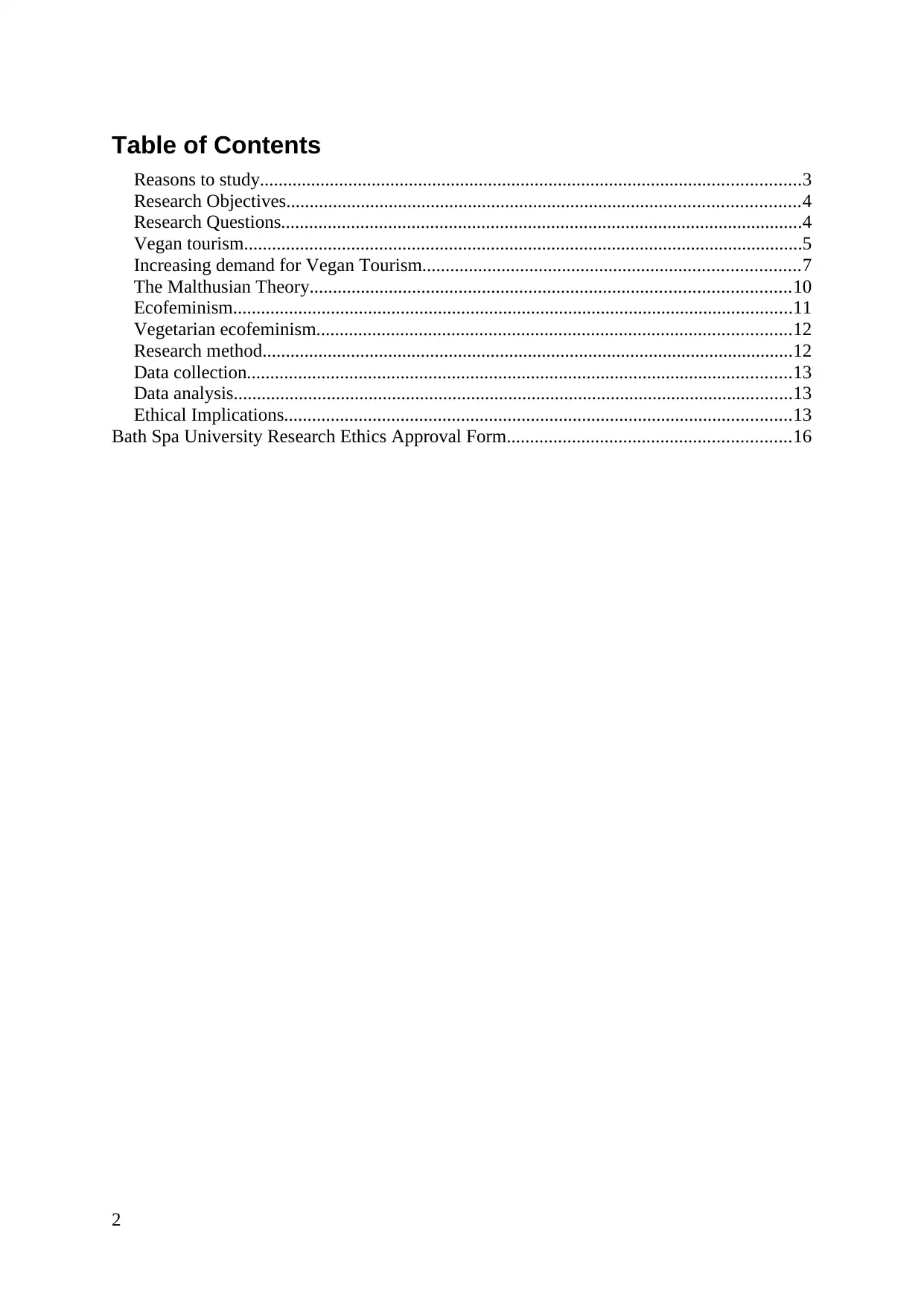
Table of Contents
Reasons to study....................................................................................................................3
Research Objectives..............................................................................................................4
Research Questions................................................................................................................4
Vegan tourism........................................................................................................................5
Increasing demand for Vegan Tourism.................................................................................7
The Malthusian Theory.......................................................................................................10
Ecofeminism........................................................................................................................11
Vegetarian ecofeminism......................................................................................................12
Research method..................................................................................................................12
Data collection.....................................................................................................................13
Data analysis........................................................................................................................13
Ethical Implications.............................................................................................................13
Bath Spa University Research Ethics Approval Form.............................................................16
2
Reasons to study....................................................................................................................3
Research Objectives..............................................................................................................4
Research Questions................................................................................................................4
Vegan tourism........................................................................................................................5
Increasing demand for Vegan Tourism.................................................................................7
The Malthusian Theory.......................................................................................................10
Ecofeminism........................................................................................................................11
Vegetarian ecofeminism......................................................................................................12
Research method..................................................................................................................12
Data collection.....................................................................................................................13
Data analysis........................................................................................................................13
Ethical Implications.............................................................................................................13
Bath Spa University Research Ethics Approval Form.............................................................16
2
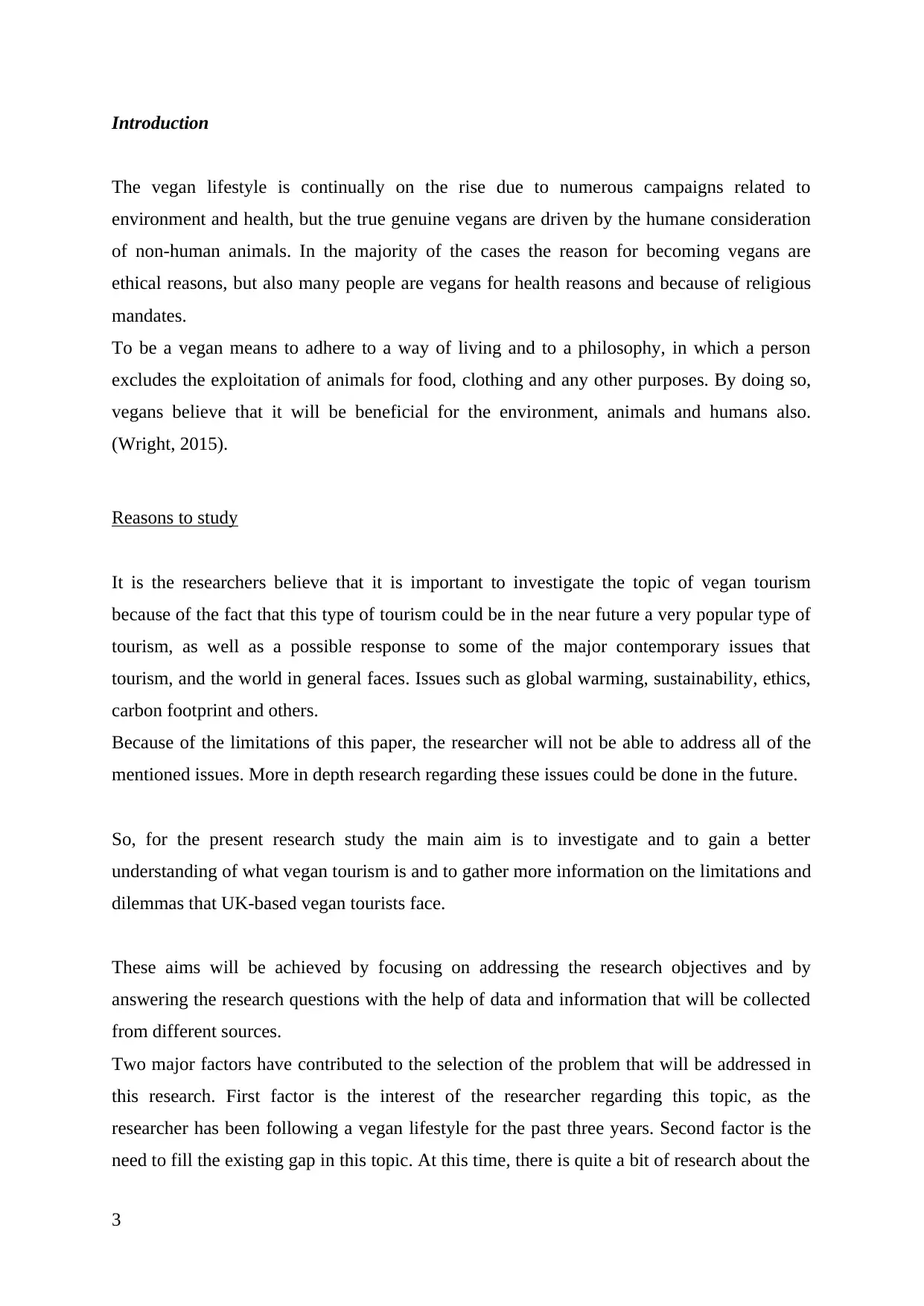
Introduction
The vegan lifestyle is continually on the rise due to numerous campaigns related to
environment and health, but the true genuine vegans are driven by the humane consideration
of non-human animals. In the majority of the cases the reason for becoming vegans are
ethical reasons, but also many people are vegans for health reasons and because of religious
mandates.
To be a vegan means to adhere to a way of living and to a philosophy, in which a person
excludes the exploitation of animals for food, clothing and any other purposes. By doing so,
vegans believe that it will be beneficial for the environment, animals and humans also.
(Wright, 2015).
Reasons to study
It is the researchers believe that it is important to investigate the topic of vegan tourism
because of the fact that this type of tourism could be in the near future a very popular type of
tourism, as well as a possible response to some of the major contemporary issues that
tourism, and the world in general faces. Issues such as global warming, sustainability, ethics,
carbon footprint and others.
Because of the limitations of this paper, the researcher will not be able to address all of the
mentioned issues. More in depth research regarding these issues could be done in the future.
So, for the present research study the main aim is to investigate and to gain a better
understanding of what vegan tourism is and to gather more information on the limitations and
dilemmas that UK-based vegan tourists face.
These aims will be achieved by focusing on addressing the research objectives and by
answering the research questions with the help of data and information that will be collected
from different sources.
Two major factors have contributed to the selection of the problem that will be addressed in
this research. First factor is the interest of the researcher regarding this topic, as the
researcher has been following a vegan lifestyle for the past three years. Second factor is the
need to fill the existing gap in this topic. At this time, there is quite a bit of research about the
3
The vegan lifestyle is continually on the rise due to numerous campaigns related to
environment and health, but the true genuine vegans are driven by the humane consideration
of non-human animals. In the majority of the cases the reason for becoming vegans are
ethical reasons, but also many people are vegans for health reasons and because of religious
mandates.
To be a vegan means to adhere to a way of living and to a philosophy, in which a person
excludes the exploitation of animals for food, clothing and any other purposes. By doing so,
vegans believe that it will be beneficial for the environment, animals and humans also.
(Wright, 2015).
Reasons to study
It is the researchers believe that it is important to investigate the topic of vegan tourism
because of the fact that this type of tourism could be in the near future a very popular type of
tourism, as well as a possible response to some of the major contemporary issues that
tourism, and the world in general faces. Issues such as global warming, sustainability, ethics,
carbon footprint and others.
Because of the limitations of this paper, the researcher will not be able to address all of the
mentioned issues. More in depth research regarding these issues could be done in the future.
So, for the present research study the main aim is to investigate and to gain a better
understanding of what vegan tourism is and to gather more information on the limitations and
dilemmas that UK-based vegan tourists face.
These aims will be achieved by focusing on addressing the research objectives and by
answering the research questions with the help of data and information that will be collected
from different sources.
Two major factors have contributed to the selection of the problem that will be addressed in
this research. First factor is the interest of the researcher regarding this topic, as the
researcher has been following a vegan lifestyle for the past three years. Second factor is the
need to fill the existing gap in this topic. At this time, there is quite a bit of research about the
3
⊘ This is a preview!⊘
Do you want full access?
Subscribe today to unlock all pages.

Trusted by 1+ million students worldwide
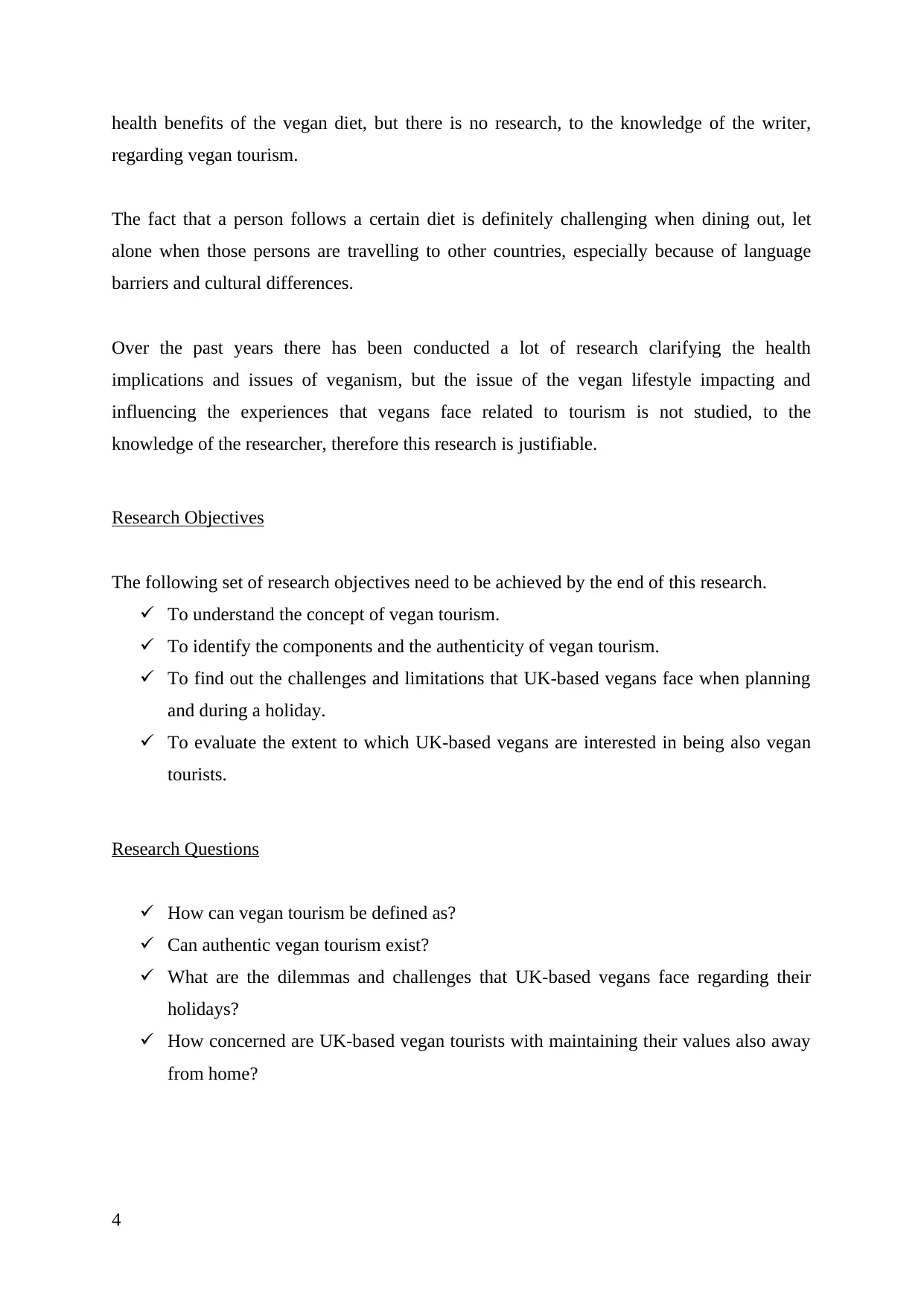
health benefits of the vegan diet, but there is no research, to the knowledge of the writer,
regarding vegan tourism.
The fact that a person follows a certain diet is definitely challenging when dining out, let
alone when those persons are travelling to other countries, especially because of language
barriers and cultural differences.
Over the past years there has been conducted a lot of research clarifying the health
implications and issues of veganism, but the issue of the vegan lifestyle impacting and
influencing the experiences that vegans face related to tourism is not studied, to the
knowledge of the researcher, therefore this research is justifiable.
Research Objectives
The following set of research objectives need to be achieved by the end of this research.
To understand the concept of vegan tourism.
To identify the components and the authenticity of vegan tourism.
To find out the challenges and limitations that UK-based vegans face when planning
and during a holiday.
To evaluate the extent to which UK-based vegans are interested in being also vegan
tourists.
Research Questions
How can vegan tourism be defined as?
Can authentic vegan tourism exist?
What are the dilemmas and challenges that UK-based vegans face regarding their
holidays?
How concerned are UK-based vegan tourists with maintaining their values also away
from home?
4
regarding vegan tourism.
The fact that a person follows a certain diet is definitely challenging when dining out, let
alone when those persons are travelling to other countries, especially because of language
barriers and cultural differences.
Over the past years there has been conducted a lot of research clarifying the health
implications and issues of veganism, but the issue of the vegan lifestyle impacting and
influencing the experiences that vegans face related to tourism is not studied, to the
knowledge of the researcher, therefore this research is justifiable.
Research Objectives
The following set of research objectives need to be achieved by the end of this research.
To understand the concept of vegan tourism.
To identify the components and the authenticity of vegan tourism.
To find out the challenges and limitations that UK-based vegans face when planning
and during a holiday.
To evaluate the extent to which UK-based vegans are interested in being also vegan
tourists.
Research Questions
How can vegan tourism be defined as?
Can authentic vegan tourism exist?
What are the dilemmas and challenges that UK-based vegans face regarding their
holidays?
How concerned are UK-based vegan tourists with maintaining their values also away
from home?
4
Paraphrase This Document
Need a fresh take? Get an instant paraphrase of this document with our AI Paraphraser
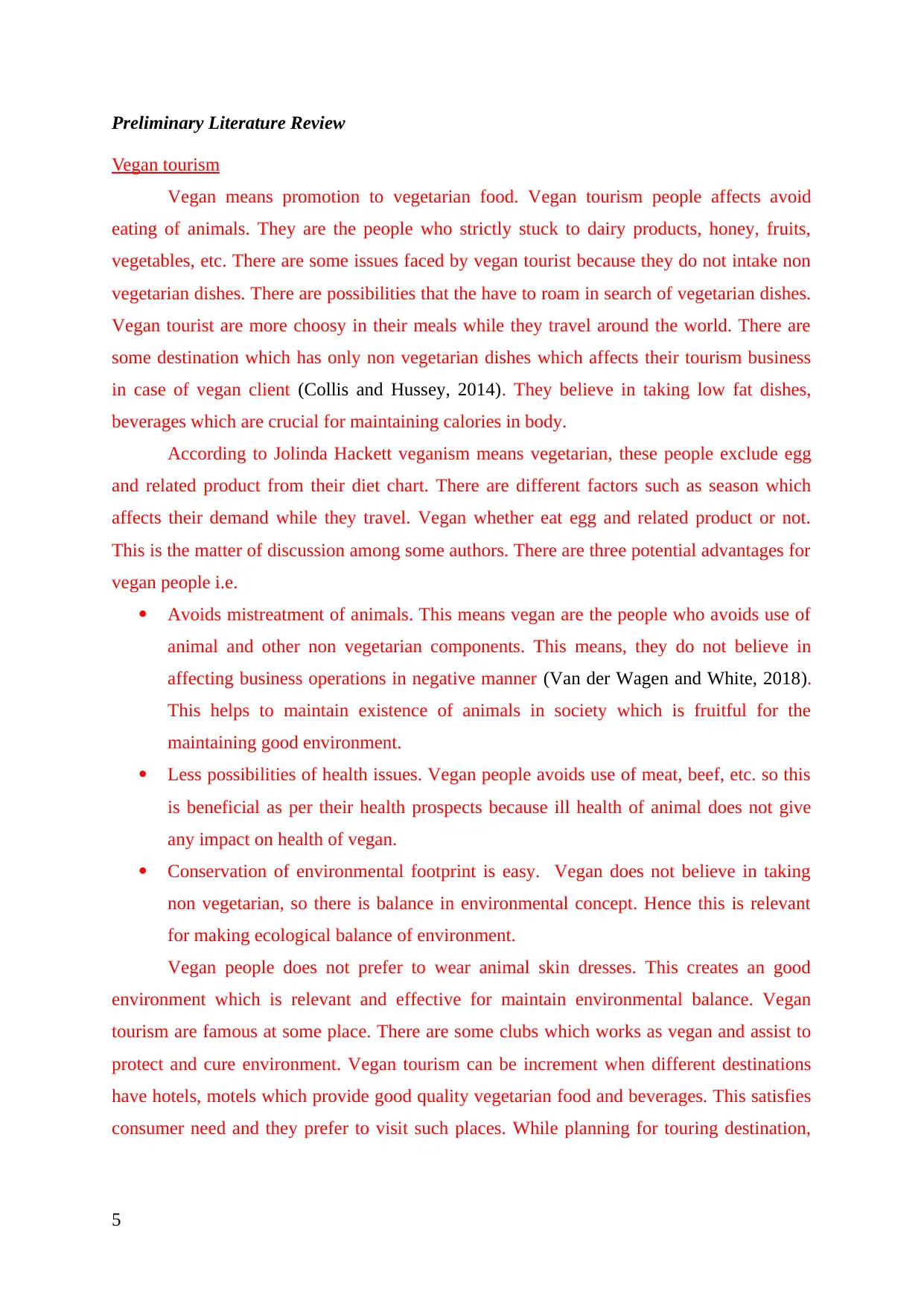
Preliminary Literature Review
Vegan tourism
Vegan means promotion to vegetarian food. Vegan tourism people affects avoid
eating of animals. They are the people who strictly stuck to dairy products, honey, fruits,
vegetables, etc. There are some issues faced by vegan tourist because they do not intake non
vegetarian dishes. There are possibilities that the have to roam in search of vegetarian dishes.
Vegan tourist are more choosy in their meals while they travel around the world. There are
some destination which has only non vegetarian dishes which affects their tourism business
in case of vegan client (Collis and Hussey, 2014). They believe in taking low fat dishes,
beverages which are crucial for maintaining calories in body.
According to Jolinda Hackett veganism means vegetarian, these people exclude egg
and related product from their diet chart. There are different factors such as season which
affects their demand while they travel. Vegan whether eat egg and related product or not.
This is the matter of discussion among some authors. There are three potential advantages for
vegan people i.e.
Avoids mistreatment of animals. This means vegan are the people who avoids use of
animal and other non vegetarian components. This means, they do not believe in
affecting business operations in negative manner (Van der Wagen and White, 2018).
This helps to maintain existence of animals in society which is fruitful for the
maintaining good environment.
Less possibilities of health issues. Vegan people avoids use of meat, beef, etc. so this
is beneficial as per their health prospects because ill health of animal does not give
any impact on health of vegan.
Conservation of environmental footprint is easy. Vegan does not believe in taking
non vegetarian, so there is balance in environmental concept. Hence this is relevant
for making ecological balance of environment.
Vegan people does not prefer to wear animal skin dresses. This creates an good
environment which is relevant and effective for maintain environmental balance. Vegan
tourism are famous at some place. There are some clubs which works as vegan and assist to
protect and cure environment. Vegan tourism can be increment when different destinations
have hotels, motels which provide good quality vegetarian food and beverages. This satisfies
consumer need and they prefer to visit such places. While planning for touring destination,
5
Vegan tourism
Vegan means promotion to vegetarian food. Vegan tourism people affects avoid
eating of animals. They are the people who strictly stuck to dairy products, honey, fruits,
vegetables, etc. There are some issues faced by vegan tourist because they do not intake non
vegetarian dishes. There are possibilities that the have to roam in search of vegetarian dishes.
Vegan tourist are more choosy in their meals while they travel around the world. There are
some destination which has only non vegetarian dishes which affects their tourism business
in case of vegan client (Collis and Hussey, 2014). They believe in taking low fat dishes,
beverages which are crucial for maintaining calories in body.
According to Jolinda Hackett veganism means vegetarian, these people exclude egg
and related product from their diet chart. There are different factors such as season which
affects their demand while they travel. Vegan whether eat egg and related product or not.
This is the matter of discussion among some authors. There are three potential advantages for
vegan people i.e.
Avoids mistreatment of animals. This means vegan are the people who avoids use of
animal and other non vegetarian components. This means, they do not believe in
affecting business operations in negative manner (Van der Wagen and White, 2018).
This helps to maintain existence of animals in society which is fruitful for the
maintaining good environment.
Less possibilities of health issues. Vegan people avoids use of meat, beef, etc. so this
is beneficial as per their health prospects because ill health of animal does not give
any impact on health of vegan.
Conservation of environmental footprint is easy. Vegan does not believe in taking
non vegetarian, so there is balance in environmental concept. Hence this is relevant
for making ecological balance of environment.
Vegan people does not prefer to wear animal skin dresses. This creates an good
environment which is relevant and effective for maintain environmental balance. Vegan
tourism are famous at some place. There are some clubs which works as vegan and assist to
protect and cure environment. Vegan tourism can be increment when different destinations
have hotels, motels which provide good quality vegetarian food and beverages. This satisfies
consumer need and they prefer to visit such places. While planning for touring destination,
5
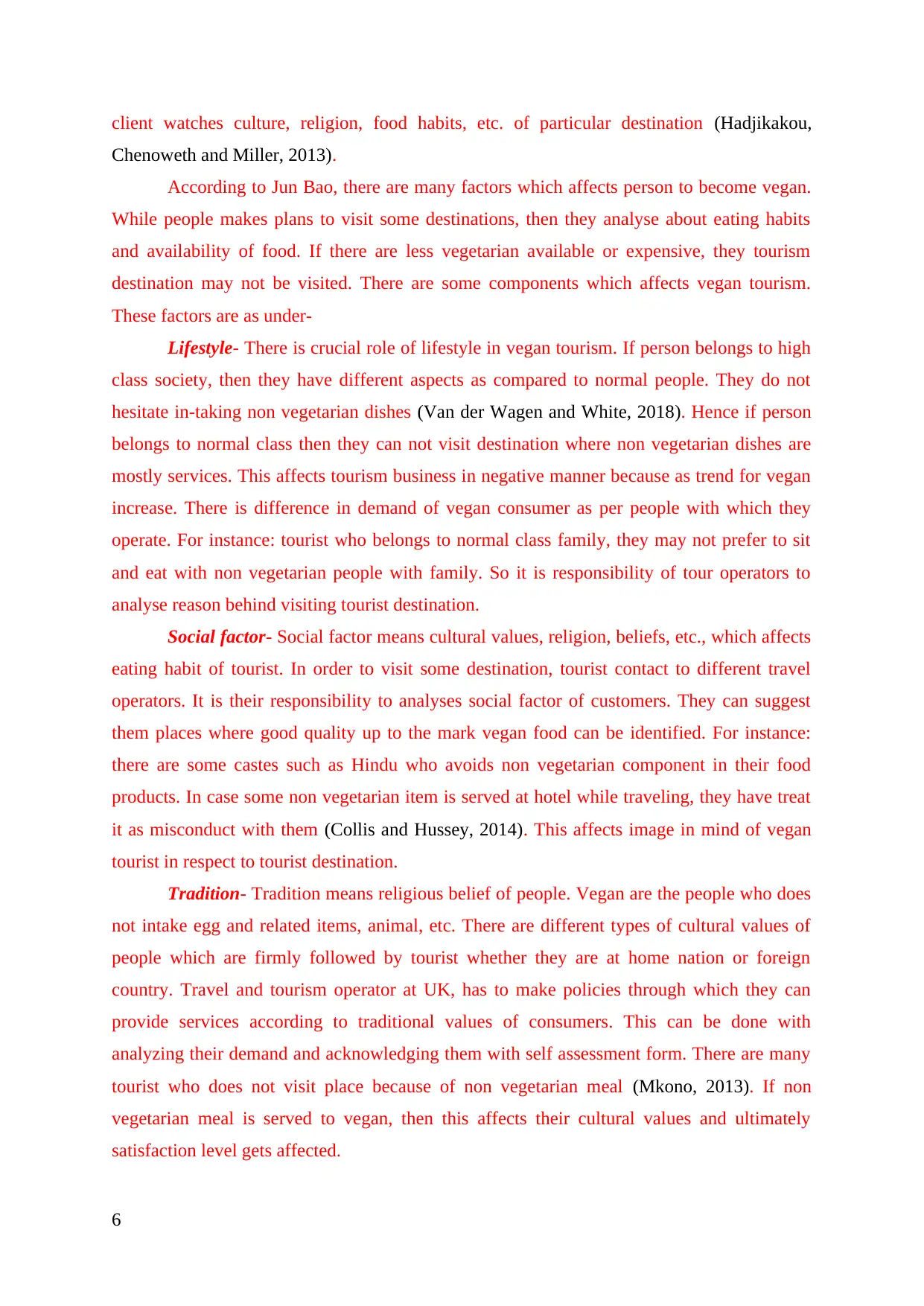
client watches culture, religion, food habits, etc. of particular destination (Hadjikakou,
Chenoweth and Miller, 2013).
According to Jun Bao, there are many factors which affects person to become vegan.
While people makes plans to visit some destinations, then they analyse about eating habits
and availability of food. If there are less vegetarian available or expensive, they tourism
destination may not be visited. There are some components which affects vegan tourism.
These factors are as under-
Lifestyle- There is crucial role of lifestyle in vegan tourism. If person belongs to high
class society, then they have different aspects as compared to normal people. They do not
hesitate in-taking non vegetarian dishes (Van der Wagen and White, 2018). Hence if person
belongs to normal class then they can not visit destination where non vegetarian dishes are
mostly services. This affects tourism business in negative manner because as trend for vegan
increase. There is difference in demand of vegan consumer as per people with which they
operate. For instance: tourist who belongs to normal class family, they may not prefer to sit
and eat with non vegetarian people with family. So it is responsibility of tour operators to
analyse reason behind visiting tourist destination.
Social factor- Social factor means cultural values, religion, beliefs, etc., which affects
eating habit of tourist. In order to visit some destination, tourist contact to different travel
operators. It is their responsibility to analyses social factor of customers. They can suggest
them places where good quality up to the mark vegan food can be identified. For instance:
there are some castes such as Hindu who avoids non vegetarian component in their food
products. In case some non vegetarian item is served at hotel while traveling, they have treat
it as misconduct with them (Collis and Hussey, 2014). This affects image in mind of vegan
tourist in respect to tourist destination.
Tradition- Tradition means religious belief of people. Vegan are the people who does
not intake egg and related items, animal, etc. There are different types of cultural values of
people which are firmly followed by tourist whether they are at home nation or foreign
country. Travel and tourism operator at UK, has to make policies through which they can
provide services according to traditional values of consumers. This can be done with
analyzing their demand and acknowledging them with self assessment form. There are many
tourist who does not visit place because of non vegetarian meal (Mkono, 2013). If non
vegetarian meal is served to vegan, then this affects their cultural values and ultimately
satisfaction level gets affected.
6
Chenoweth and Miller, 2013).
According to Jun Bao, there are many factors which affects person to become vegan.
While people makes plans to visit some destinations, then they analyse about eating habits
and availability of food. If there are less vegetarian available or expensive, they tourism
destination may not be visited. There are some components which affects vegan tourism.
These factors are as under-
Lifestyle- There is crucial role of lifestyle in vegan tourism. If person belongs to high
class society, then they have different aspects as compared to normal people. They do not
hesitate in-taking non vegetarian dishes (Van der Wagen and White, 2018). Hence if person
belongs to normal class then they can not visit destination where non vegetarian dishes are
mostly services. This affects tourism business in negative manner because as trend for vegan
increase. There is difference in demand of vegan consumer as per people with which they
operate. For instance: tourist who belongs to normal class family, they may not prefer to sit
and eat with non vegetarian people with family. So it is responsibility of tour operators to
analyse reason behind visiting tourist destination.
Social factor- Social factor means cultural values, religion, beliefs, etc., which affects
eating habit of tourist. In order to visit some destination, tourist contact to different travel
operators. It is their responsibility to analyses social factor of customers. They can suggest
them places where good quality up to the mark vegan food can be identified. For instance:
there are some castes such as Hindu who avoids non vegetarian component in their food
products. In case some non vegetarian item is served at hotel while traveling, they have treat
it as misconduct with them (Collis and Hussey, 2014). This affects image in mind of vegan
tourist in respect to tourist destination.
Tradition- Tradition means religious belief of people. Vegan are the people who does
not intake egg and related items, animal, etc. There are different types of cultural values of
people which are firmly followed by tourist whether they are at home nation or foreign
country. Travel and tourism operator at UK, has to make policies through which they can
provide services according to traditional values of consumers. This can be done with
analyzing their demand and acknowledging them with self assessment form. There are many
tourist who does not visit place because of non vegetarian meal (Mkono, 2013). If non
vegetarian meal is served to vegan, then this affects their cultural values and ultimately
satisfaction level gets affected.
6
⊘ This is a preview!⊘
Do you want full access?
Subscribe today to unlock all pages.

Trusted by 1+ million students worldwide
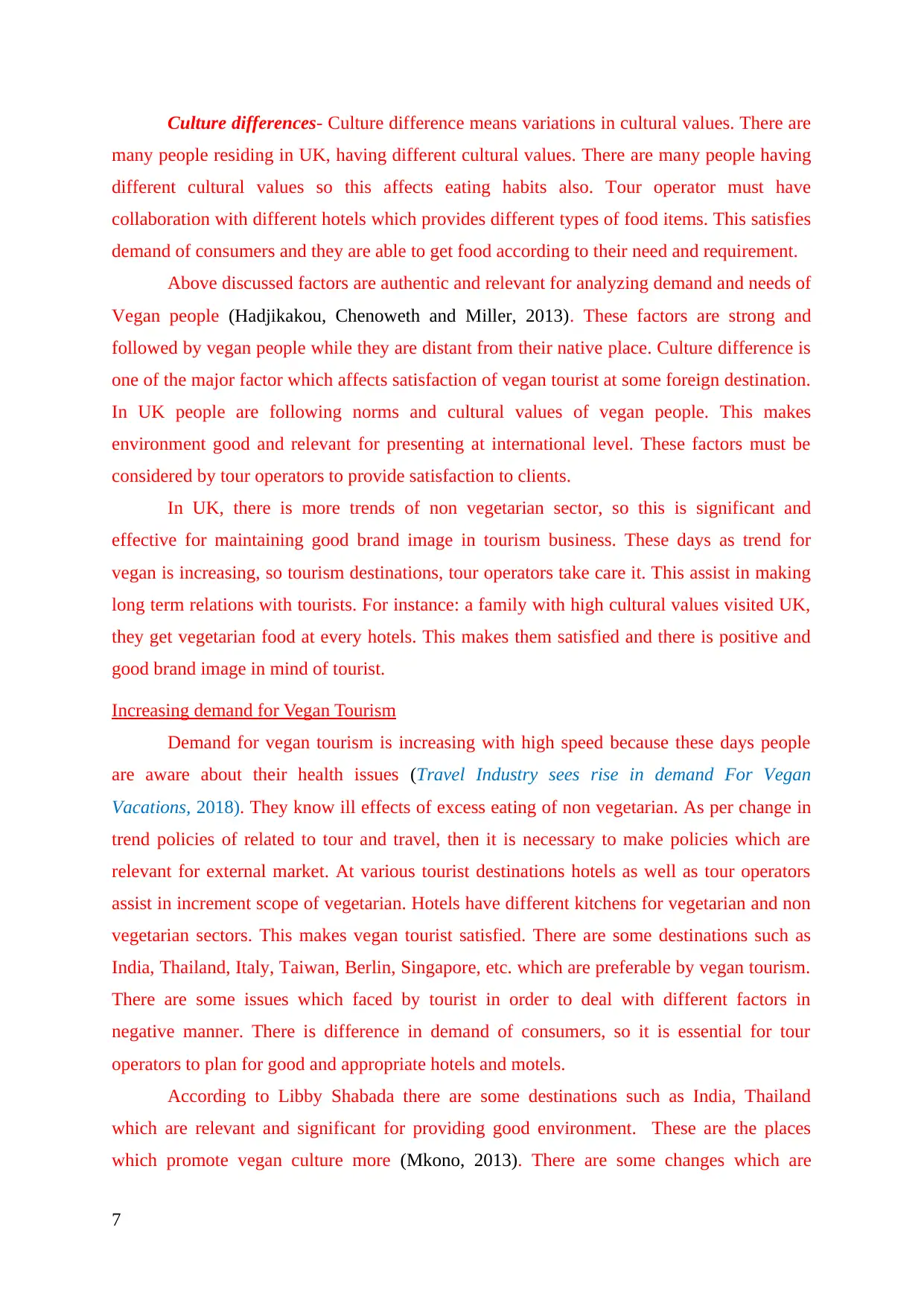
Culture differences- Culture difference means variations in cultural values. There are
many people residing in UK, having different cultural values. There are many people having
different cultural values so this affects eating habits also. Tour operator must have
collaboration with different hotels which provides different types of food items. This satisfies
demand of consumers and they are able to get food according to their need and requirement.
Above discussed factors are authentic and relevant for analyzing demand and needs of
Vegan people (Hadjikakou, Chenoweth and Miller, 2013). These factors are strong and
followed by vegan people while they are distant from their native place. Culture difference is
one of the major factor which affects satisfaction of vegan tourist at some foreign destination.
In UK people are following norms and cultural values of vegan people. This makes
environment good and relevant for presenting at international level. These factors must be
considered by tour operators to provide satisfaction to clients.
In UK, there is more trends of non vegetarian sector, so this is significant and
effective for maintaining good brand image in tourism business. These days as trend for
vegan is increasing, so tourism destinations, tour operators take care it. This assist in making
long term relations with tourists. For instance: a family with high cultural values visited UK,
they get vegetarian food at every hotels. This makes them satisfied and there is positive and
good brand image in mind of tourist.
Increasing demand for Vegan Tourism
Demand for vegan tourism is increasing with high speed because these days people
are aware about their health issues (Travel Industry sees rise in demand For Vegan
Vacations, 2018). They know ill effects of excess eating of non vegetarian. As per change in
trend policies of related to tour and travel, then it is necessary to make policies which are
relevant for external market. At various tourist destinations hotels as well as tour operators
assist in increment scope of vegetarian. Hotels have different kitchens for vegetarian and non
vegetarian sectors. This makes vegan tourist satisfied. There are some destinations such as
India, Thailand, Italy, Taiwan, Berlin, Singapore, etc. which are preferable by vegan tourism.
There are some issues which faced by tourist in order to deal with different factors in
negative manner. There is difference in demand of consumers, so it is essential for tour
operators to plan for good and appropriate hotels and motels.
According to Libby Shabada there are some destinations such as India, Thailand
which are relevant and significant for providing good environment. These are the places
which promote vegan culture more (Mkono, 2013). There are some changes which are
7
many people residing in UK, having different cultural values. There are many people having
different cultural values so this affects eating habits also. Tour operator must have
collaboration with different hotels which provides different types of food items. This satisfies
demand of consumers and they are able to get food according to their need and requirement.
Above discussed factors are authentic and relevant for analyzing demand and needs of
Vegan people (Hadjikakou, Chenoweth and Miller, 2013). These factors are strong and
followed by vegan people while they are distant from their native place. Culture difference is
one of the major factor which affects satisfaction of vegan tourist at some foreign destination.
In UK people are following norms and cultural values of vegan people. This makes
environment good and relevant for presenting at international level. These factors must be
considered by tour operators to provide satisfaction to clients.
In UK, there is more trends of non vegetarian sector, so this is significant and
effective for maintaining good brand image in tourism business. These days as trend for
vegan is increasing, so tourism destinations, tour operators take care it. This assist in making
long term relations with tourists. For instance: a family with high cultural values visited UK,
they get vegetarian food at every hotels. This makes them satisfied and there is positive and
good brand image in mind of tourist.
Increasing demand for Vegan Tourism
Demand for vegan tourism is increasing with high speed because these days people
are aware about their health issues (Travel Industry sees rise in demand For Vegan
Vacations, 2018). They know ill effects of excess eating of non vegetarian. As per change in
trend policies of related to tour and travel, then it is necessary to make policies which are
relevant for external market. At various tourist destinations hotels as well as tour operators
assist in increment scope of vegetarian. Hotels have different kitchens for vegetarian and non
vegetarian sectors. This makes vegan tourist satisfied. There are some destinations such as
India, Thailand, Italy, Taiwan, Berlin, Singapore, etc. which are preferable by vegan tourism.
There are some issues which faced by tourist in order to deal with different factors in
negative manner. There is difference in demand of consumers, so it is essential for tour
operators to plan for good and appropriate hotels and motels.
According to Libby Shabada there are some destinations such as India, Thailand
which are relevant and significant for providing good environment. These are the places
which promote vegan culture more (Mkono, 2013). There are some changes which are
7
Paraphrase This Document
Need a fresh take? Get an instant paraphrase of this document with our AI Paraphraser
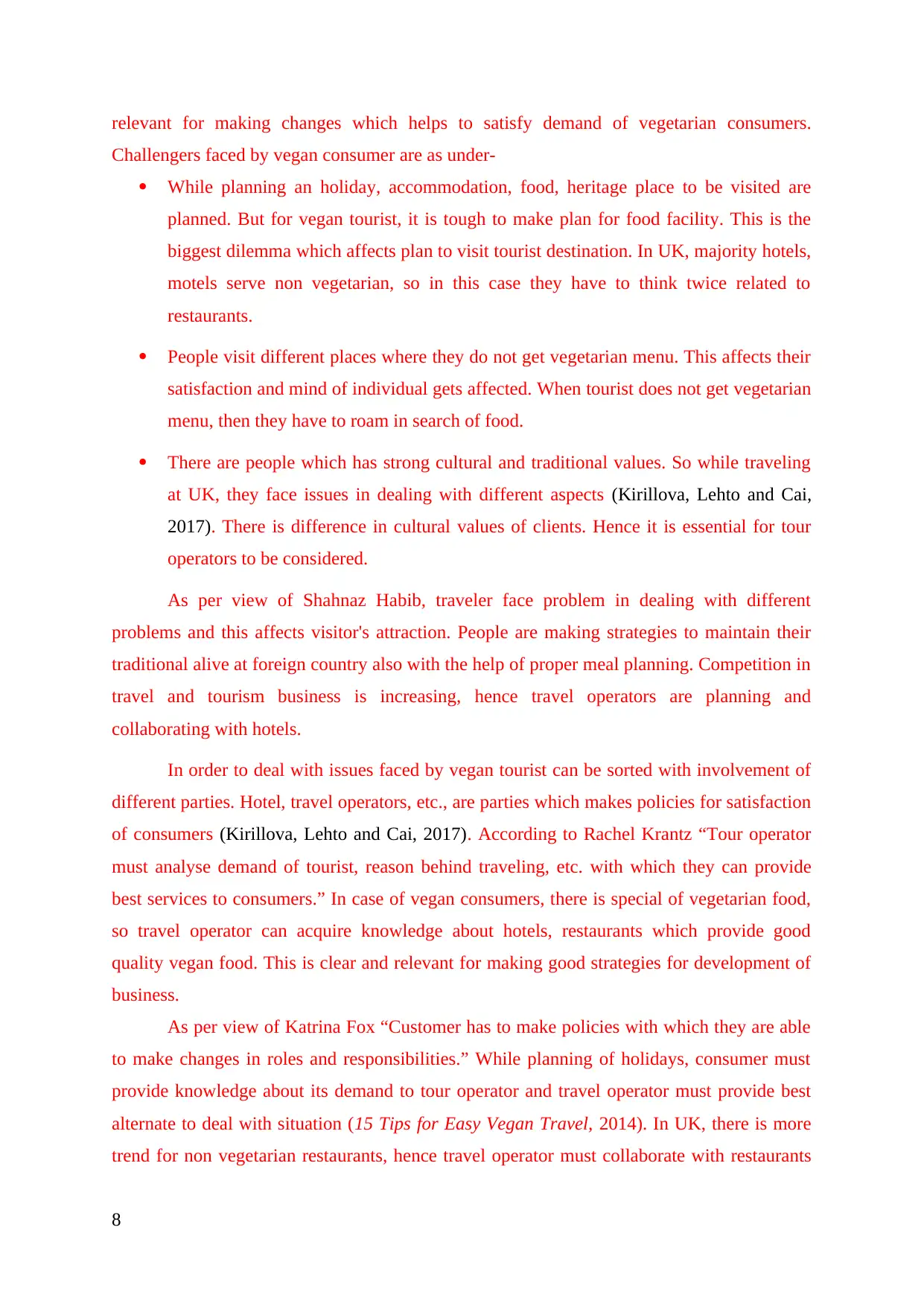
relevant for making changes which helps to satisfy demand of vegetarian consumers.
Challengers faced by vegan consumer are as under-
While planning an holiday, accommodation, food, heritage place to be visited are
planned. But for vegan tourist, it is tough to make plan for food facility. This is the
biggest dilemma which affects plan to visit tourist destination. In UK, majority hotels,
motels serve non vegetarian, so in this case they have to think twice related to
restaurants.
People visit different places where they do not get vegetarian menu. This affects their
satisfaction and mind of individual gets affected. When tourist does not get vegetarian
menu, then they have to roam in search of food.
There are people which has strong cultural and traditional values. So while traveling
at UK, they face issues in dealing with different aspects (Kirillova, Lehto and Cai,
2017). There is difference in cultural values of clients. Hence it is essential for tour
operators to be considered.
As per view of Shahnaz Habib, traveler face problem in dealing with different
problems and this affects visitor's attraction. People are making strategies to maintain their
traditional alive at foreign country also with the help of proper meal planning. Competition in
travel and tourism business is increasing, hence travel operators are planning and
collaborating with hotels.
In order to deal with issues faced by vegan tourist can be sorted with involvement of
different parties. Hotel, travel operators, etc., are parties which makes policies for satisfaction
of consumers (Kirillova, Lehto and Cai, 2017). According to Rachel Krantz “Tour operator
must analyse demand of tourist, reason behind traveling, etc. with which they can provide
best services to consumers.” In case of vegan consumers, there is special of vegetarian food,
so travel operator can acquire knowledge about hotels, restaurants which provide good
quality vegan food. This is clear and relevant for making good strategies for development of
business.
As per view of Katrina Fox “Customer has to make policies with which they are able
to make changes in roles and responsibilities.” While planning of holidays, consumer must
provide knowledge about its demand to tour operator and travel operator must provide best
alternate to deal with situation (15 Tips for Easy Vegan Travel, 2014). In UK, there is more
trend for non vegetarian restaurants, hence travel operator must collaborate with restaurants
8
Challengers faced by vegan consumer are as under-
While planning an holiday, accommodation, food, heritage place to be visited are
planned. But for vegan tourist, it is tough to make plan for food facility. This is the
biggest dilemma which affects plan to visit tourist destination. In UK, majority hotels,
motels serve non vegetarian, so in this case they have to think twice related to
restaurants.
People visit different places where they do not get vegetarian menu. This affects their
satisfaction and mind of individual gets affected. When tourist does not get vegetarian
menu, then they have to roam in search of food.
There are people which has strong cultural and traditional values. So while traveling
at UK, they face issues in dealing with different aspects (Kirillova, Lehto and Cai,
2017). There is difference in cultural values of clients. Hence it is essential for tour
operators to be considered.
As per view of Shahnaz Habib, traveler face problem in dealing with different
problems and this affects visitor's attraction. People are making strategies to maintain their
traditional alive at foreign country also with the help of proper meal planning. Competition in
travel and tourism business is increasing, hence travel operators are planning and
collaborating with hotels.
In order to deal with issues faced by vegan tourist can be sorted with involvement of
different parties. Hotel, travel operators, etc., are parties which makes policies for satisfaction
of consumers (Kirillova, Lehto and Cai, 2017). According to Rachel Krantz “Tour operator
must analyse demand of tourist, reason behind traveling, etc. with which they can provide
best services to consumers.” In case of vegan consumers, there is special of vegetarian food,
so travel operator can acquire knowledge about hotels, restaurants which provide good
quality vegan food. This is clear and relevant for making good strategies for development of
business.
As per view of Katrina Fox “Customer has to make policies with which they are able
to make changes in roles and responsibilities.” While planning of holidays, consumer must
provide knowledge about its demand to tour operator and travel operator must provide best
alternate to deal with situation (15 Tips for Easy Vegan Travel, 2014). In UK, there is more
trend for non vegetarian restaurants, hence travel operator must collaborate with restaurants
8
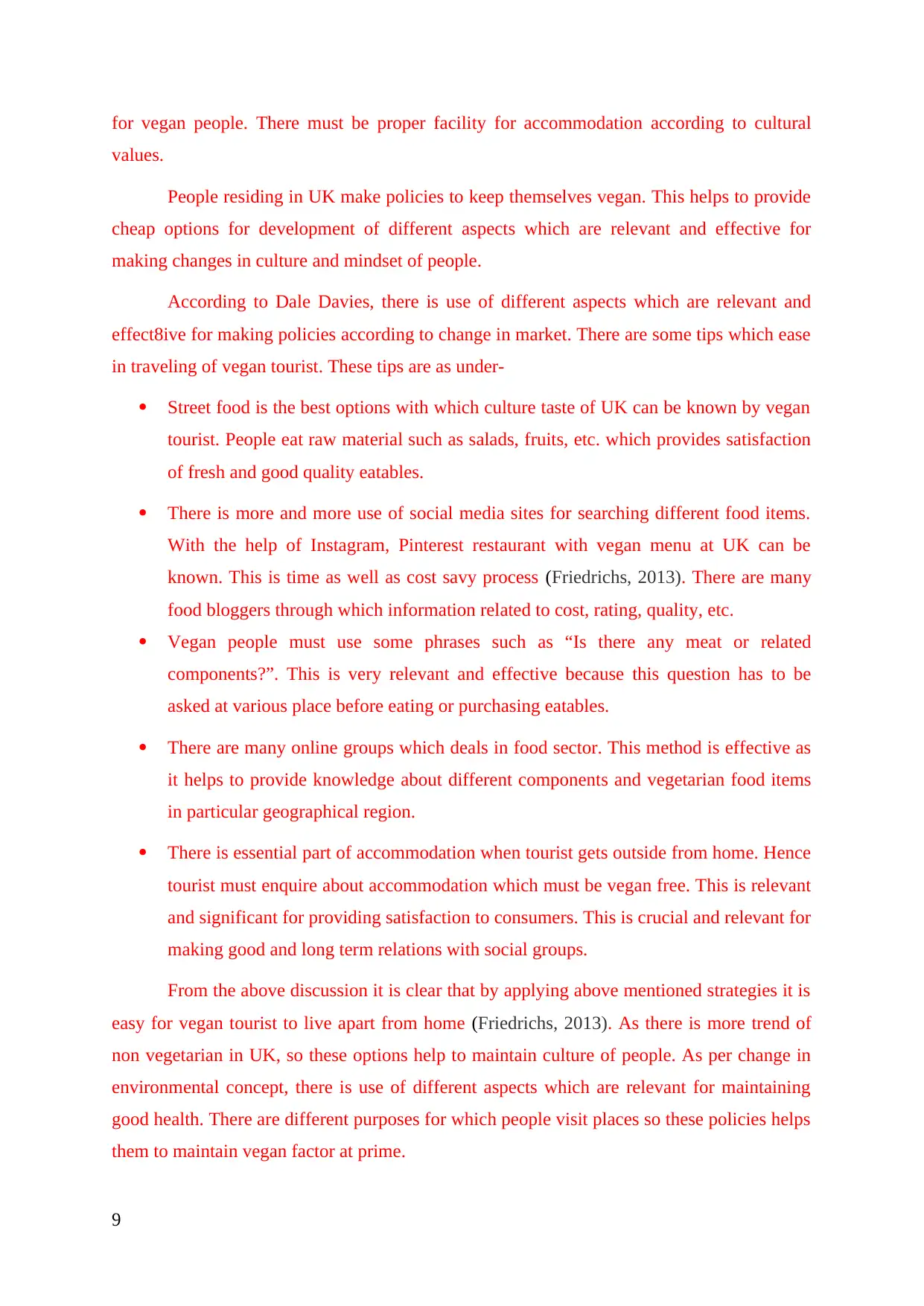
for vegan people. There must be proper facility for accommodation according to cultural
values.
People residing in UK make policies to keep themselves vegan. This helps to provide
cheap options for development of different aspects which are relevant and effective for
making changes in culture and mindset of people.
According to Dale Davies, there is use of different aspects which are relevant and
effect8ive for making policies according to change in market. There are some tips which ease
in traveling of vegan tourist. These tips are as under-
Street food is the best options with which culture taste of UK can be known by vegan
tourist. People eat raw material such as salads, fruits, etc. which provides satisfaction
of fresh and good quality eatables.
There is more and more use of social media sites for searching different food items.
With the help of Instagram, Pinterest restaurant with vegan menu at UK can be
known. This is time as well as cost savy process (Friedrichs, 2013). There are many
food bloggers through which information related to cost, rating, quality, etc.
Vegan people must use some phrases such as “Is there any meat or related
components?”. This is very relevant and effective because this question has to be
asked at various place before eating or purchasing eatables.
There are many online groups which deals in food sector. This method is effective as
it helps to provide knowledge about different components and vegetarian food items
in particular geographical region.
There is essential part of accommodation when tourist gets outside from home. Hence
tourist must enquire about accommodation which must be vegan free. This is relevant
and significant for providing satisfaction to consumers. This is crucial and relevant for
making good and long term relations with social groups.
From the above discussion it is clear that by applying above mentioned strategies it is
easy for vegan tourist to live apart from home (Friedrichs, 2013). As there is more trend of
non vegetarian in UK, so these options help to maintain culture of people. As per change in
environmental concept, there is use of different aspects which are relevant for maintaining
good health. There are different purposes for which people visit places so these policies helps
them to maintain vegan factor at prime.
9
values.
People residing in UK make policies to keep themselves vegan. This helps to provide
cheap options for development of different aspects which are relevant and effective for
making changes in culture and mindset of people.
According to Dale Davies, there is use of different aspects which are relevant and
effect8ive for making policies according to change in market. There are some tips which ease
in traveling of vegan tourist. These tips are as under-
Street food is the best options with which culture taste of UK can be known by vegan
tourist. People eat raw material such as salads, fruits, etc. which provides satisfaction
of fresh and good quality eatables.
There is more and more use of social media sites for searching different food items.
With the help of Instagram, Pinterest restaurant with vegan menu at UK can be
known. This is time as well as cost savy process (Friedrichs, 2013). There are many
food bloggers through which information related to cost, rating, quality, etc.
Vegan people must use some phrases such as “Is there any meat or related
components?”. This is very relevant and effective because this question has to be
asked at various place before eating or purchasing eatables.
There are many online groups which deals in food sector. This method is effective as
it helps to provide knowledge about different components and vegetarian food items
in particular geographical region.
There is essential part of accommodation when tourist gets outside from home. Hence
tourist must enquire about accommodation which must be vegan free. This is relevant
and significant for providing satisfaction to consumers. This is crucial and relevant for
making good and long term relations with social groups.
From the above discussion it is clear that by applying above mentioned strategies it is
easy for vegan tourist to live apart from home (Friedrichs, 2013). As there is more trend of
non vegetarian in UK, so these options help to maintain culture of people. As per change in
environmental concept, there is use of different aspects which are relevant for maintaining
good health. There are different purposes for which people visit places so these policies helps
them to maintain vegan factor at prime.
9
⊘ This is a preview!⊘
Do you want full access?
Subscribe today to unlock all pages.

Trusted by 1+ million students worldwide
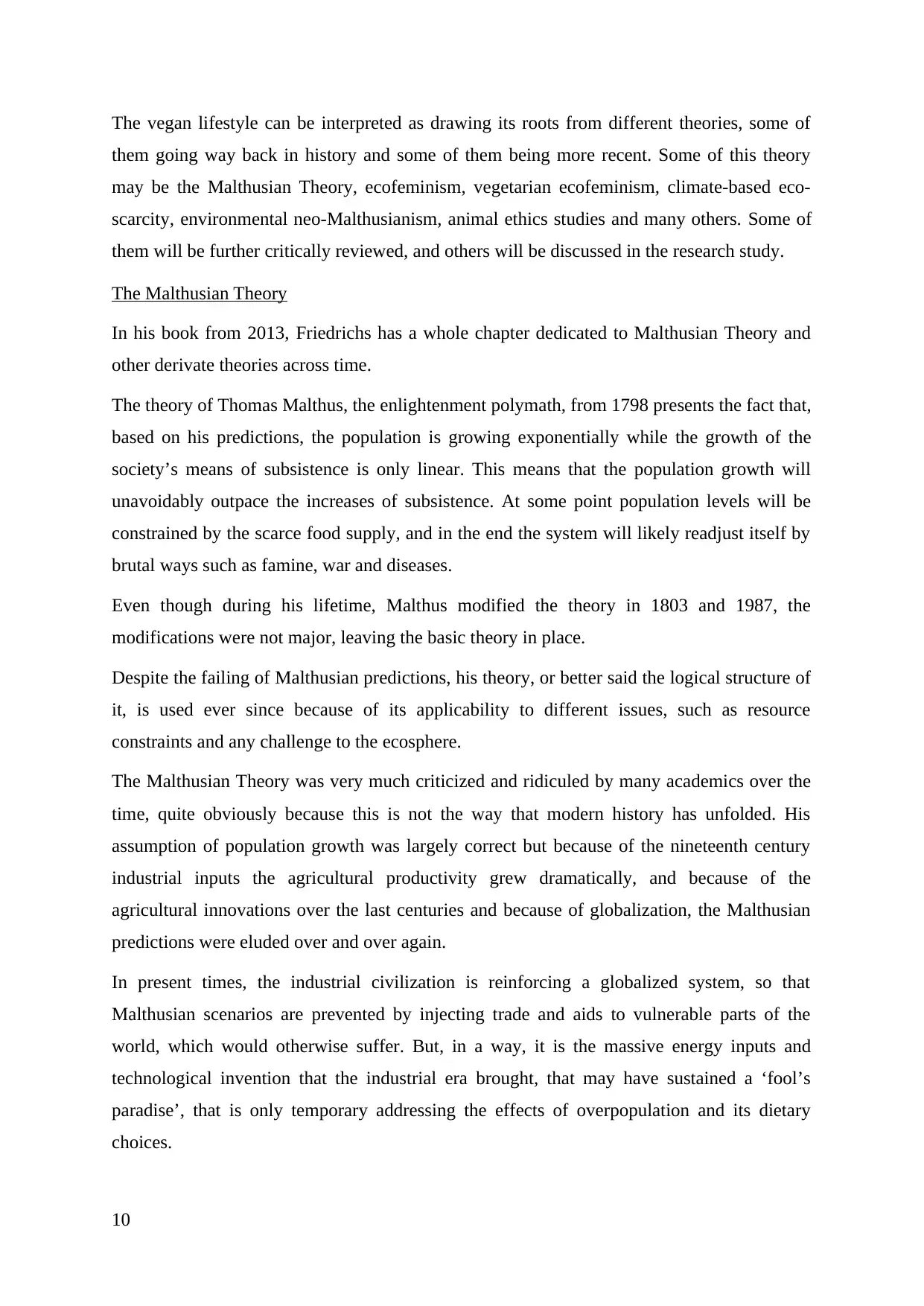
The vegan lifestyle can be interpreted as drawing its roots from different theories, some of
them going way back in history and some of them being more recent. Some of this theory
may be the Malthusian Theory, ecofeminism, vegetarian ecofeminism, climate-based eco-
scarcity, environmental neo-Malthusianism, animal ethics studies and many others. Some of
them will be further critically reviewed, and others will be discussed in the research study.
The Malthusian Theory
In his book from 2013, Friedrichs has a whole chapter dedicated to Malthusian Theory and
other derivate theories across time.
The theory of Thomas Malthus, the enlightenment polymath, from 1798 presents the fact that,
based on his predictions, the population is growing exponentially while the growth of the
society’s means of subsistence is only linear. This means that the population growth will
unavoidably outpace the increases of subsistence. At some point population levels will be
constrained by the scarce food supply, and in the end the system will likely readjust itself by
brutal ways such as famine, war and diseases.
Even though during his lifetime, Malthus modified the theory in 1803 and 1987, the
modifications were not major, leaving the basic theory in place.
Despite the failing of Malthusian predictions, his theory, or better said the logical structure of
it, is used ever since because of its applicability to different issues, such as resource
constraints and any challenge to the ecosphere.
The Malthusian Theory was very much criticized and ridiculed by many academics over the
time, quite obviously because this is not the way that modern history has unfolded. His
assumption of population growth was largely correct but because of the nineteenth century
industrial inputs the agricultural productivity grew dramatically, and because of the
agricultural innovations over the last centuries and because of globalization, the Malthusian
predictions were eluded over and over again.
In present times, the industrial civilization is reinforcing a globalized system, so that
Malthusian scenarios are prevented by injecting trade and aids to vulnerable parts of the
world, which would otherwise suffer. But, in a way, it is the massive energy inputs and
technological invention that the industrial era brought, that may have sustained a ‘fool’s
paradise’, that is only temporary addressing the effects of overpopulation and its dietary
choices.
10
them going way back in history and some of them being more recent. Some of this theory
may be the Malthusian Theory, ecofeminism, vegetarian ecofeminism, climate-based eco-
scarcity, environmental neo-Malthusianism, animal ethics studies and many others. Some of
them will be further critically reviewed, and others will be discussed in the research study.
The Malthusian Theory
In his book from 2013, Friedrichs has a whole chapter dedicated to Malthusian Theory and
other derivate theories across time.
The theory of Thomas Malthus, the enlightenment polymath, from 1798 presents the fact that,
based on his predictions, the population is growing exponentially while the growth of the
society’s means of subsistence is only linear. This means that the population growth will
unavoidably outpace the increases of subsistence. At some point population levels will be
constrained by the scarce food supply, and in the end the system will likely readjust itself by
brutal ways such as famine, war and diseases.
Even though during his lifetime, Malthus modified the theory in 1803 and 1987, the
modifications were not major, leaving the basic theory in place.
Despite the failing of Malthusian predictions, his theory, or better said the logical structure of
it, is used ever since because of its applicability to different issues, such as resource
constraints and any challenge to the ecosphere.
The Malthusian Theory was very much criticized and ridiculed by many academics over the
time, quite obviously because this is not the way that modern history has unfolded. His
assumption of population growth was largely correct but because of the nineteenth century
industrial inputs the agricultural productivity grew dramatically, and because of the
agricultural innovations over the last centuries and because of globalization, the Malthusian
predictions were eluded over and over again.
In present times, the industrial civilization is reinforcing a globalized system, so that
Malthusian scenarios are prevented by injecting trade and aids to vulnerable parts of the
world, which would otherwise suffer. But, in a way, it is the massive energy inputs and
technological invention that the industrial era brought, that may have sustained a ‘fool’s
paradise’, that is only temporary addressing the effects of overpopulation and its dietary
choices.
10
Paraphrase This Document
Need a fresh take? Get an instant paraphrase of this document with our AI Paraphraser
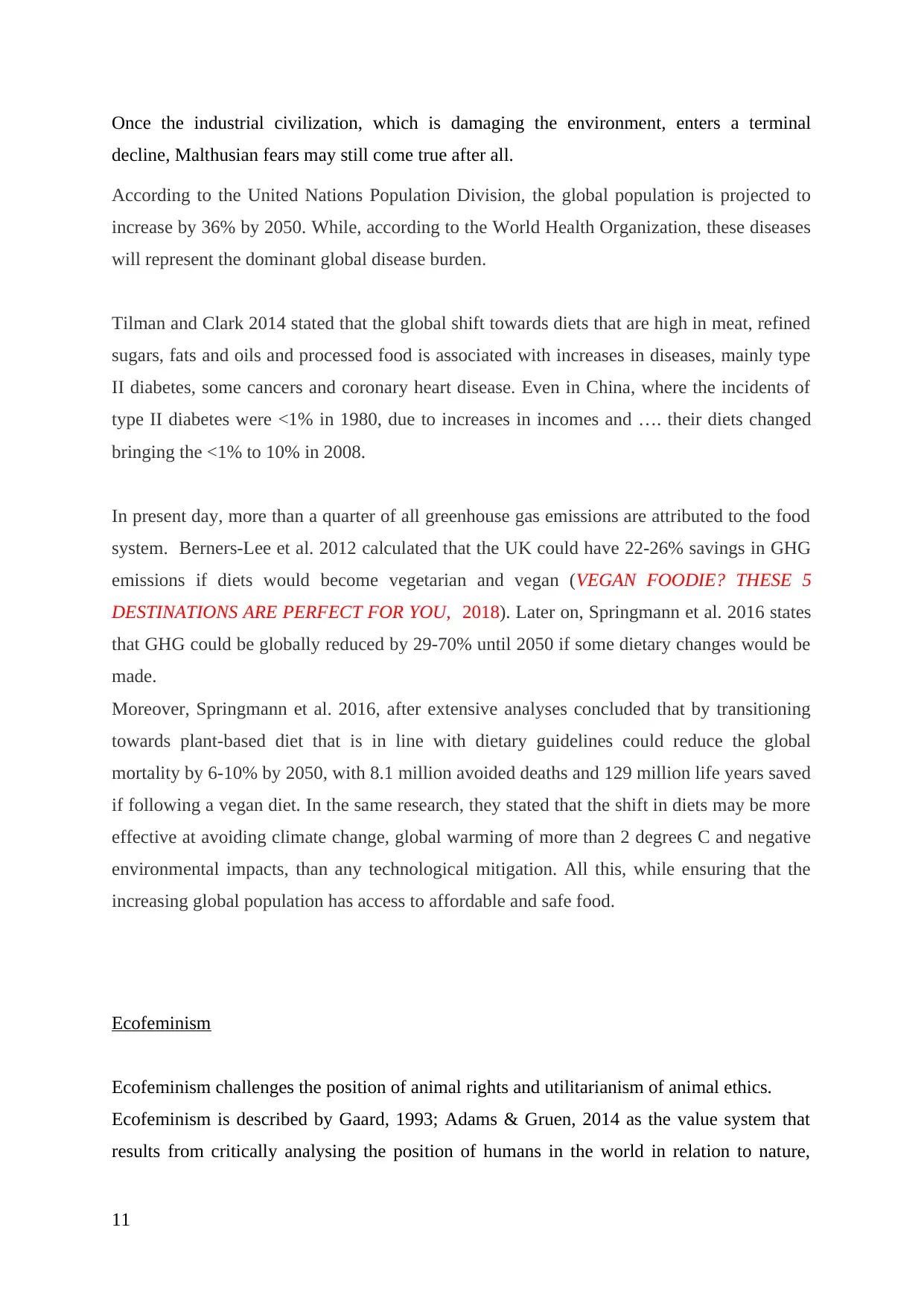
Once the industrial civilization, which is damaging the environment, enters a terminal
decline, Malthusian fears may still come true after all.
According to the United Nations Population Division, the global population is projected to
increase by 36% by 2050. While, according to the World Health Organization, these diseases
will represent the dominant global disease burden.
Tilman and Clark 2014 stated that the global shift towards diets that are high in meat, refined
sugars, fats and oils and processed food is associated with increases in diseases, mainly type
II diabetes, some cancers and coronary heart disease. Even in China, where the incidents of
type II diabetes were <1% in 1980, due to increases in incomes and …. their diets changed
bringing the <1% to 10% in 2008.
In present day, more than a quarter of all greenhouse gas emissions are attributed to the food
system. Berners-Lee et al. 2012 calculated that the UK could have 22-26% savings in GHG
emissions if diets would become vegetarian and vegan (VEGAN FOODIE? THESE 5
DESTINATIONS ARE PERFECT FOR YOU, 2018). Later on, Springmann et al. 2016 states
that GHG could be globally reduced by 29-70% until 2050 if some dietary changes would be
made.
Moreover, Springmann et al. 2016, after extensive analyses concluded that by transitioning
towards plant-based diet that is in line with dietary guidelines could reduce the global
mortality by 6-10% by 2050, with 8.1 million avoided deaths and 129 million life years saved
if following a vegan diet. In the same research, they stated that the shift in diets may be more
effective at avoiding climate change, global warming of more than 2 degrees C and negative
environmental impacts, than any technological mitigation. All this, while ensuring that the
increasing global population has access to affordable and safe food.
Ecofeminism
Ecofeminism challenges the position of animal rights and utilitarianism of animal ethics.
Ecofeminism is described by Gaard, 1993; Adams & Gruen, 2014 as the value system that
results from critically analysing the position of humans in the world in relation to nature,
11
decline, Malthusian fears may still come true after all.
According to the United Nations Population Division, the global population is projected to
increase by 36% by 2050. While, according to the World Health Organization, these diseases
will represent the dominant global disease burden.
Tilman and Clark 2014 stated that the global shift towards diets that are high in meat, refined
sugars, fats and oils and processed food is associated with increases in diseases, mainly type
II diabetes, some cancers and coronary heart disease. Even in China, where the incidents of
type II diabetes were <1% in 1980, due to increases in incomes and …. their diets changed
bringing the <1% to 10% in 2008.
In present day, more than a quarter of all greenhouse gas emissions are attributed to the food
system. Berners-Lee et al. 2012 calculated that the UK could have 22-26% savings in GHG
emissions if diets would become vegetarian and vegan (VEGAN FOODIE? THESE 5
DESTINATIONS ARE PERFECT FOR YOU, 2018). Later on, Springmann et al. 2016 states
that GHG could be globally reduced by 29-70% until 2050 if some dietary changes would be
made.
Moreover, Springmann et al. 2016, after extensive analyses concluded that by transitioning
towards plant-based diet that is in line with dietary guidelines could reduce the global
mortality by 6-10% by 2050, with 8.1 million avoided deaths and 129 million life years saved
if following a vegan diet. In the same research, they stated that the shift in diets may be more
effective at avoiding climate change, global warming of more than 2 degrees C and negative
environmental impacts, than any technological mitigation. All this, while ensuring that the
increasing global population has access to affordable and safe food.
Ecofeminism
Ecofeminism challenges the position of animal rights and utilitarianism of animal ethics.
Ecofeminism is described by Gaard, 1993; Adams & Gruen, 2014 as the value system that
results from critically analysing the position of humans in the world in relation to nature,
11
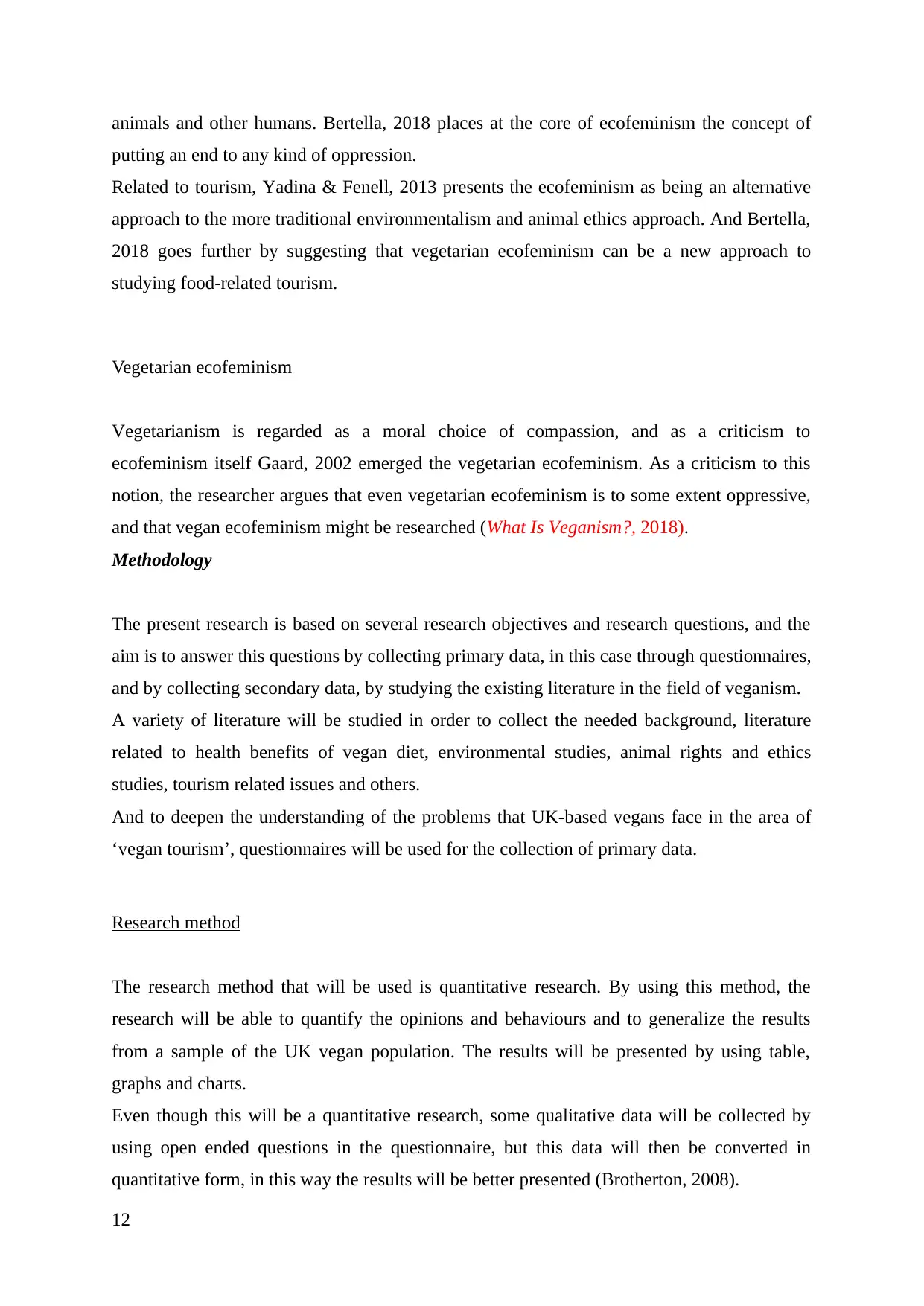
animals and other humans. Bertella, 2018 places at the core of ecofeminism the concept of
putting an end to any kind of oppression.
Related to tourism, Yadina & Fenell, 2013 presents the ecofeminism as being an alternative
approach to the more traditional environmentalism and animal ethics approach. And Bertella,
2018 goes further by suggesting that vegetarian ecofeminism can be a new approach to
studying food-related tourism.
Vegetarian ecofeminism
Vegetarianism is regarded as a moral choice of compassion, and as a criticism to
ecofeminism itself Gaard, 2002 emerged the vegetarian ecofeminism. As a criticism to this
notion, the researcher argues that even vegetarian ecofeminism is to some extent oppressive,
and that vegan ecofeminism might be researched (What Is Veganism?, 2018).
Methodology
The present research is based on several research objectives and research questions, and the
aim is to answer this questions by collecting primary data, in this case through questionnaires,
and by collecting secondary data, by studying the existing literature in the field of veganism.
A variety of literature will be studied in order to collect the needed background, literature
related to health benefits of vegan diet, environmental studies, animal rights and ethics
studies, tourism related issues and others.
And to deepen the understanding of the problems that UK-based vegans face in the area of
‘vegan tourism’, questionnaires will be used for the collection of primary data.
Research method
The research method that will be used is quantitative research. By using this method, the
research will be able to quantify the opinions and behaviours and to generalize the results
from a sample of the UK vegan population. The results will be presented by using table,
graphs and charts.
Even though this will be a quantitative research, some qualitative data will be collected by
using open ended questions in the questionnaire, but this data will then be converted in
quantitative form, in this way the results will be better presented (Brotherton, 2008).
12
putting an end to any kind of oppression.
Related to tourism, Yadina & Fenell, 2013 presents the ecofeminism as being an alternative
approach to the more traditional environmentalism and animal ethics approach. And Bertella,
2018 goes further by suggesting that vegetarian ecofeminism can be a new approach to
studying food-related tourism.
Vegetarian ecofeminism
Vegetarianism is regarded as a moral choice of compassion, and as a criticism to
ecofeminism itself Gaard, 2002 emerged the vegetarian ecofeminism. As a criticism to this
notion, the researcher argues that even vegetarian ecofeminism is to some extent oppressive,
and that vegan ecofeminism might be researched (What Is Veganism?, 2018).
Methodology
The present research is based on several research objectives and research questions, and the
aim is to answer this questions by collecting primary data, in this case through questionnaires,
and by collecting secondary data, by studying the existing literature in the field of veganism.
A variety of literature will be studied in order to collect the needed background, literature
related to health benefits of vegan diet, environmental studies, animal rights and ethics
studies, tourism related issues and others.
And to deepen the understanding of the problems that UK-based vegans face in the area of
‘vegan tourism’, questionnaires will be used for the collection of primary data.
Research method
The research method that will be used is quantitative research. By using this method, the
research will be able to quantify the opinions and behaviours and to generalize the results
from a sample of the UK vegan population. The results will be presented by using table,
graphs and charts.
Even though this will be a quantitative research, some qualitative data will be collected by
using open ended questions in the questionnaire, but this data will then be converted in
quantitative form, in this way the results will be better presented (Brotherton, 2008).
12
⊘ This is a preview!⊘
Do you want full access?
Subscribe today to unlock all pages.

Trusted by 1+ million students worldwide
1 out of 22
Related Documents
Your All-in-One AI-Powered Toolkit for Academic Success.
+13062052269
info@desklib.com
Available 24*7 on WhatsApp / Email
![[object Object]](/_next/static/media/star-bottom.7253800d.svg)
Unlock your academic potential
Copyright © 2020–2025 A2Z Services. All Rights Reserved. Developed and managed by ZUCOL.





